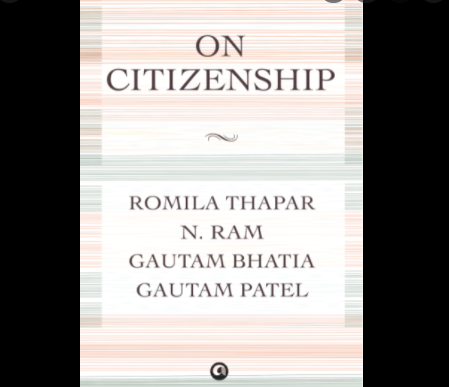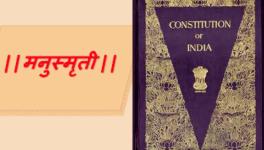Citizenship and Constitution

Image courtesy Aleph Book Company
In On Citizenship, four of India’s finest public intellectuals go deep into key aspects of what constitutes citizenship in India, an issue that has lately been the subject of furious public debate, as a result of controversial decisions by the government in power.
In ‘Citizenship and the Constitution’, the legal scholar and writer Gautam Bhatia explores constitutional provisions relating to citizenship. He shows how Part II of the Constitution ‘articulates a vision of Indian citizenship that is interwoven with the Indian constitutional identity as a whole: secular, egalitarian, and non-discriminatory’.
The following is an excerpt from Bhatia’s essay.
In 1947, when it began its great project of framing the Indian Constitution, the Constituent Assembly was faced with a stark choice: an inclusive and universal vision of Indian citizenship, or a narrow vision that privileged ascriptive identities in prioritizing claims to Indianness. Even before Independence, the Constituent Assembly was clear in its choice: it chose the former.
Independence, the violence and bitterness of Partition, and the establishment of Pakistan as a state based on religion, put that commitment to severe test. The mass migration that followed Partition forced the Constituent Assembly to scramble to accommodate the refugees who came from across the newly born borders, many of them fleeing religious violence. There were some in the Assembly who suggested that the only way to meet this moment was, like Pakistan, to model Indianness on religious lines, and to treat India as a default homeland for some identities—but not others. The stakes were clear, and the Constituent Assembly turned down that proposal. Even as it drafted, worked, and reworked provisions to deal with the largest human exodus in history, it did not let go of the constitutional commitment to universal citizenship, and to civic rather than religious or ethnic nationalism.
Also read | ‘The Right to be a Citizen’ by Romila Thapar
Through debate and dissension, the Assembly finally came around to endorse a holistic constitutional vision, a vision founded on principles of republicanism, secularism, equality and non-discrimination, and inclusion. The citizenship chapter formed an integral part of the web, a thread in the design. In this essay, I have tried to show that taking the citizenship clauses in isolation, and reading into them a permission to introduce religious tests for citizenship, will mean nothing less than an unravelling of that design. Or, to put it in constitutional terms, the Constitutional commitment to secularism and nondiscrimination acts as an implied limitation on Parliament’s powers to determine citizenship under Article 11 of the Constitution. Citizenship—as a condition of entry into the political community—cannot be such as to defeat the founding identity of that polity, an identity enshrined in the Constitution.
This reading, I hope, will help bring to life the longdead provisions in Chapter II of the Constitution. The relevance of Articles 5 to 8 did not end with the end of the refugee crisis after Partition. Seventy years later, the rigorously universal and non-discriminatory language of these provisions is a reminder of the path that the Constituent Assembly could have chosen to walk—but didn’t. It is in the rejection of sectarian citizenship, at a moment when the fire of religious hatred and persecution was at its peak, that the universal humanism of the Indian Constitution’s citizenship chapter truly shines through.
This is an excerpt from Gautam Bhatia's essay in On Citizenship (2021) published by Aleph Book Company. Republished here with permission from the publisher.
Gautam Bhatia is a legal scholar and writer. His essays have appeared in the Oxford Handbook for the Indian Constitution, Max Planck Encyclopedia of Comparative Constitutional Law, and in journals such as Constellations and Global Constitutionalism. He has published three books—Offend, Shock, or Disturb: Freedom of Speech Under the Indian Constitution, The Transformative Constitution: A Radical Biography in Nine Acts, and a novel, The Wall.
Get the latest reports & analysis with people's perspective on Protests, movements & deep analytical videos, discussions of the current affairs in your Telegram app. Subscribe to NewsClick's Telegram channel & get Real-Time updates on stories, as they get published on our website.
























